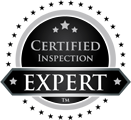When your family is searching for its dream home, the most disappointing thing that can happen is finding it, but discovering through inspection that the home is not sound.
You want to know the home you are planning to purchase is in good shape, inside and out, so the home inspection stage is not something to be avoided.
The experts at Real Home Inspections Niagara have this advice for potential home buyers: With this much money at stake, a thermal imaging scan is worth 1,000 words!

Most home inspectors don’t used thermal imaging because of the cost, or if they do, it is at an additional charge for a thermal scan. At Real Home Inspections we recognize it as an invaluable tool which gives our clients the most thorough inspection, and we do this at no additional cost.
The tool exists because a simple science has been applied to small, hand-held devices that can be used to make “pictures” of things that can’t be seen.Here’s how they work:
Infrared thermography, or IRT, thermal imaging and thermal video are examples of infrared imaging science. Cameras are used to detect radiation and produce images of that radiation, called thermograms.
Thermograms can help diagnose problems inside things, which can’t be seen normally. For example, digital medical thermography is used to diagnose illnesses and imbalances - think the electrocardiogram (ECG), or the electroencephalogram (EEG).

But the technology has also been applied to the construction industry, and is used by contractors and inspectors to diagnose problems within walls – things that have gone wrong with plumbing or electrical systems, that leave heat signatures, but can’t be seen. While the scanner doesn’t actually see behind the wall, it will be able to pick up variations in the heat signature radiating off a surface.
A thermal imaging scanner creates images using infrared radiation - a type of “night vision” technology - the same way a cat scan can create pictures of a human brain. The scanners don’t measure temperature; they measure radiated, thermal energy from which temperature is derived, based on the amount of energy detected. The data is converted into a colourized image, showing variations in the area’s thermal signature.
RHI experts use thermal imaging scanners daily to help us discover issues with a home’s electrical system; to detect heat loss from walls, pipes, heating and cooling equipment, doors and windows; detect missing or defective insulation; detect air leaks; identify problem areas where there might be mould, and also to identify problem areas on a roof, such as gaps or punctures of roofing materials.

Another use is to detect thermal bridges, or areas where energy is being wasted. As the camera “sees” increased or decreased surface temperatures, it can pinpoint problem areas of heat, cold and possible condensation damage.
RHI Niagara experts keep up with training on how to apply the thermal imaging scanners in our daily work. While expensive, they are a versatile tool with many applications, some of which are still being discovered.
We use a thermal imaging scanner during inspections to help our clients make decisions about purchasing homes or businesses.
Like a doctor and her stethoscope, we wouldn’t leave home without it.
Ready for inspection and your own thermal imaging scan? To book an inspection, visit us on our website HERE, or give us a call at 905-401-7586. Our office serves the Niagara region and surrounding areas, and is open 24 hours, seven days per week.
– With assistance from https://energy.gov/energysaver/thermographic-inspections




Trust and an expert in his field. Thanks for everything